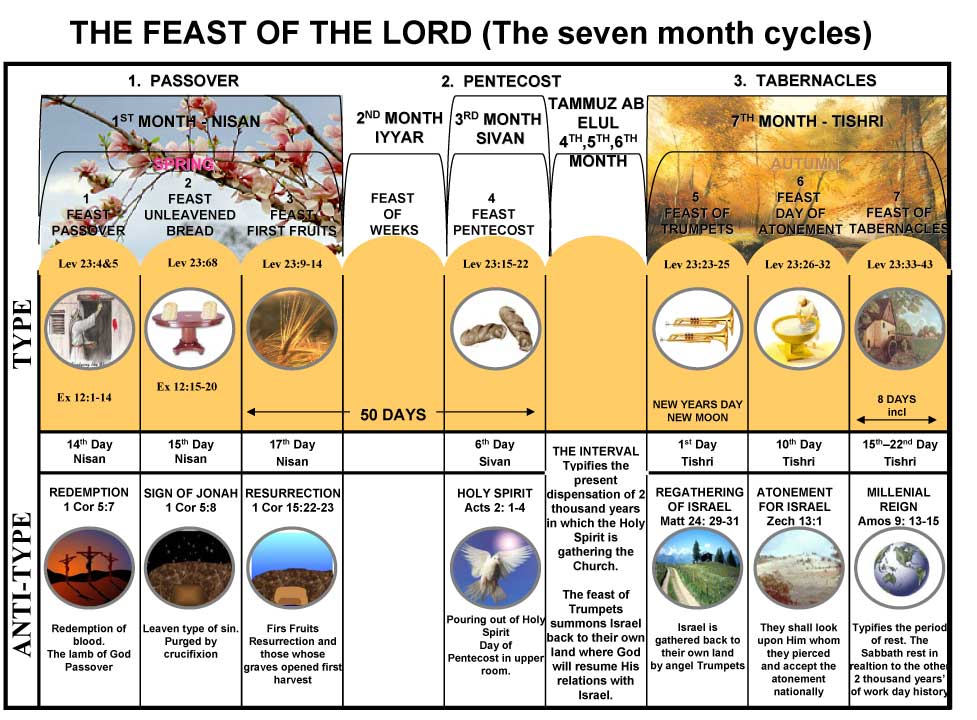7. (Lev 23 v 26–32) The Day of Atonement (Yom Kippur).
And the Lord spoke to Moses, saying: “Also the tenth day of this seventh month shall be the Day of Atonement. It shall be a holy convocation for you; you shall afflict your souls, and offer an offering made by fire to the Lord. And you shall do no work on that same day, for it is the Day of Atonement, to make atonement for you before the Lord your God. For any person who is not afflicted in soul on that same day shall be cut off from his people. And any person who does any work on that same day, that person I will destroy from among his people.
You shall do no manner of work; it shall be a statute forever throughout your generations in all your dwellings. It shall be to you a Sabbath of solemn rest, and you shall afflict your souls; on the ninth day of the month at evening, from evening to evening, you shall celebrate your Sabbath.”
a. Also the tenth day of this seventh month shall be the Day of Atonement: On the tenth of Tishri, the people gathered again for a holy convocation; but this was not a celebration feast, but a day to afflict your souls in humble recognition of one’s sin and need for atonement.
b. And you shall afflict your souls: The specific priestly procedures for the Day of Atonement were described in Leviticus 16. This passage records the command for the people of Israel to set that day aside as a solemn day of reflection.
8. (Lev 23 v 33–44) The Feast of Tabernacles (Succoth).
Then the Lord spoke to Moses, saying, “Speak to the children of Israel, saying: ‘The fifteenth day of this seventh month shall be the Feast of Tabernacles for seven days to the Lord. On the first day there shall be a holy convocation. You shall do no customary work on it. For seven days you shall offer an offering made by fire to the Lord. On the eighth day you shall have a holy convocation, and you shall offer an offering made by fire to the Lord. It is a sacred assembly, and you shall do no customary work on it.
These are the feasts of the Lord which you shall proclaim to be holy convocations, to offer an offering made by fire to the Lord, a burnt offering and a grain offering, a sacrifice and drink offerings, everything on its day; besides the Sabbaths of the Lord, besides your gifts, besides all your vows, and besides all your freewill offerings which you give to the Lord. Also on the fifteenth day of the seventh month, when you have gathered in the fruit of the land, you shall keep the feast of the Lord for seven days; on the first day there shall be a Sabbath-rest, and on the eighth day a Sabbath-rest. And you shall take for yourselves on the first day the fruit of beautiful trees, branches of palm trees, the boughs of leafy trees, and willows of the brook; and you shall rejoice before the Lord your God for seven days. You shall keep it as a feast to the Lord for seven days in the year. It shall be a statute forever in your generations. You shall celebrate it in the seventh month. You shall dwell in booths for seven days. All who are native Israelites shall dwell in booths, that your generations may know that I made the children of Israel dwell in booths when I brought them out of the land of Egypt: I am the Lord your God.’” So Moses declared to the children of Israel the feasts of the Lord.
a. The fifteenth day of this seventh month shall be the Feast of Tabernacles: On the fifteenth day of the Jewish month Tishri (on the Jewish ceremonial calendar); the Feast of Tabernacles was a time to rejoice in God’s deliverance and provision for Israel during the time of wilderness wandering; a time when having come into the promised land, looking back with gratitude on all God had done to deliver and provide in the tough times of the wilderness.
b. On the first day there shall be a Sabbath-rest, and on the eighth day a Sabbath rest: The Feast of Tabernacles began and ended in rest; it was all about celebration and rest and refreshment.
